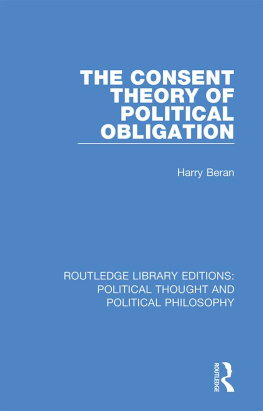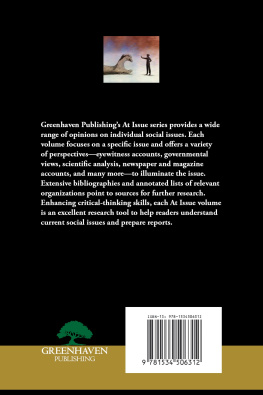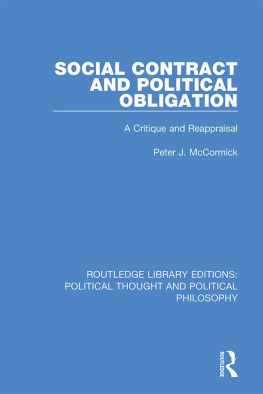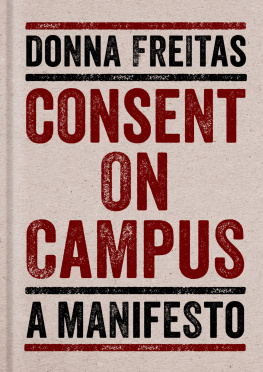ROUTLEDGE LIBRARY EDITIONS:
POLITICAL THOUGHT AND POLITICAL PHILOSOPHY
Volume 7
THE CONSENT THEORY OF POLITICAL OBLIGATION
THE CONSENT THEORY OF POLITICAL OBLIGATION
HARRY BERAN
First published in 1987 by Croom Helm Ltd
This edition first published in 2020
by Routledge
2 Park Square, Milton Park, Abingdon, Oxon OX14 4RN
and by Routledge
52 Vanderbilt Avenue, New York, NY 10017
Routledge is an imprint of the Taylor & Francis Group, an informa business
1987 Harry Beran
All rights reserved. No part of this book may be reprinted or reproduced or utilised in any form or by any electronic, mechanical, or other means, now known or hereafter invented, including photocopying and recording, or in any information storage or retrieval system, without permission in writing from the publishers.
Trademark notice: Product or corporate names may be trademarks or registered trademarks, and are used only for identification and explanation without intent to infringe.
British Library Cataloguing in Publication Data
A catalogue record for this book is available from the British Library
ISBN: 978-0-367-21961-1 (Set)
ISBN: 978-0-429-35434-2 (Set) (ebk)
ISBN: 978-0-367-23084-5 (Volume 7) (hbk)
ISBN: 978-0-429-27828-0 (Volume 7) (ebk)
Publishers Note
The publisher has gone to great lengths to ensure the quality of this reprint but points out that some imperfections in the original copies may be apparent.
Disclaimer
The publisher has made every effort to trace copyright holders and would welcome correspondence from those they have been unable to trace.
The Consent Theory of Political Obligation
Harry Beran
1987 Harry Beran
Croom Helm Publishers Ltd, Provident House,
Burrell Row, Beckenham, Kent BR3 1AT
Croom Helm Australia, 4450 Waterloo Road,
North Ryde, 2113, New South Wales
British Library Cataloguing in Publication Data
Beran, Harry
The consent theory of political obligation.
(Croom Helm international series in social and political thought)
1. Allegiance
I. Title
323.6.5 JC328
ISBN 0-7099-5077-2
Published in the USA by
Croom Helm
in association with Methuen, Inc.
29 West 35th Street
New York, NY 10001
Library of Congress Cataloging-in-Publication Data
Beran, Harry.
The consent theory of political obligation.
(Croom Helm international series in social and political thought)
Bibliography: p.
Includes index.
1. Consensus (Social sciences) 2. Legitimacy of governments. 3. Liberty. I. Title. II. Series.
JC328.2.B46 1987 320.011 87-13574
ISBN 0-7099-5077-2
Printed and bound in Great Britain
by Billing & Sons Limited, Worcester.
Contents
This version of consent theory began its life as a doctoral dissertation in 1973 and has constantly evolved since then. Many colleagues have provided encouragement, suggestions and helpful criticism of various kinds, among them Preston King, John McCloskey, John Charvet, John Kilkullen, Regina Pacher-Theinburg, George Molnar, the late Stanley Benn, the late John Plamenatz, Carole Pateman, Keith Campbell, Paul Brownsey, Michael Lesnoff, David Lloyd-Thomas and Michael Jackson. It only remains to extend my thanks for such help and to express my regret for any failure to make better use of it.
I would also like to thank Bill Ireson for his helpful suggestions and for preparing the manuscript for press; and Joan Hutchinson and Dianne Smith-Cullen who produced the original typescript with amazing grace, speed and competence.
In , I use ideas previously presented in the following articles:
Ought, Obligation and Duty, Australasian Journal of Philosophy, 50 (1972)
Political Obligation and Democracy, Australasian Journal of Philosophy, 54 (1976)
In Defense of the Consent Theory of Political Obligation and Authority, Ethics, 87 (1977)
What is the Basis of Political Authority?, The Monist, 66 (1983)
A Liberal Theory of Secession, Political Studies, XXXII (1984)
My greatest debt is of course to the classics of consent and contract theory.
(In some places the use of personal pronouns can be avoided only by such cumbersome locutions as one or he or she. Until someone invents euphonious sexually neutral pronouns for English, the least evil may be for male authors to use he and female ones to use she in such places.)
Fr meine Mutter,
Lisl Arztmiller
In this book I try to make plausible the claim that, within liberal democratic theory, political obligation and authority must rest on the actual personal consent of citizens.
The book tries to fill a surprising gap in contemporary political theory. The consent theory of political obligation is the most commonly accepted theory of political obligation in the history of Western political philosophy (often of course in the form of contract theory).
Much about restating consent theory in contemporary terms can be learnt from the writers who have, in recent years, written in support of the claim that actual consent is the basis of political obligation and authority. H.D. Lewis (1940) draws attention to the narrow scope of consent theory (he points out that consent is intended to explain only one of the possible moral reasons for obeying the law) and demolishes some of Humes objections to it. But he does nothing to indicate what consent consists in. Others offer three different accounts as to what it consists in. Joseph Tussman (1960) identifies it with acceptance of membership in the state, but acknowledges that many adult citizens do not accept such membership with the knowledge that this counts as consent. John Plamenatz (1967) and D.D. Raphael (1970) identify it with participation in democratic elections. And H.L.A. Hart (1955, pp. 1856) and John Rawls (in an early article: 1964) identify it with the acceptance of the benefits of the law-abidingness of ones fellow citizens. Michael Walzer (1970) gives all three forms of consent some role in his account of the extent to which consent can be found in liberal democracies, but considers political participation to be the best expression of it.
All these writers claim or assume that consent-based political obligation and authority is at least possible and actually exists to some substantial extent, in contemporary liberal democracies with their representative form of government. Carole Pateman (1979), however, asserts that the problem of political obligation cannot be solved within liberal democratic theory, partly because it is, she claims, necessarily a theory of representative democracy. She holds that the problem of political obligation can be solved only within a theory of participatory democracy. Pateman appears to identify the consent which creates political obligation with participation in the law-making of direct democracy.
Though all the writers mentioned explicitly support some version of consent theory, none gives anything remotely like a full and systematic exposition or defence of it. To fill this gap I spell out the assumptions of democratic liberalism which,















